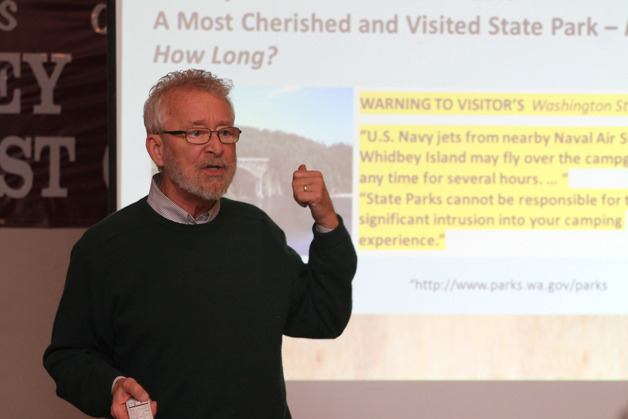Citizens of the Ebey’s Reserve, the group that filed a lawsuit against the U.S. Navy for excessive flights and jet noise around Central Whidbey, found a bit of support Thursday on South Whidbey.
Though the boost it got in Langley was smaller than other visits, such as one to Port Townsend earlier this year that drew 100 people, a handful of the group’s members emphasized the validity of their fight, which COER officials estimate has cost between $30,000 and $40,000 in legal fees and noise studies.
“Our goal is to close OLF [Outlying Field Coupeville],” said Ken Pickard, a member of Citizens of the Ebey’s Reserve. “And we’re going to close the OLF.”
Those who attended shared their concerns and stories of jet noise disrupting their lives, even as far south as Bayview — well away from the published OLF flight patterns.
“My perception is people down south think they are immune from things that happen north of Freeland,” Pickard said. “You are not immune.”
Of the 17 people who attended the presentation — excluding the COER members — not one spoke in favor of the Navy.
Some COER members had hoped for a greater turnout from South Whidbey’s liberal demographic. Coupeville resident Jerome Rosen, however, said defying the Navy may be daunting. Having COER continue its fight and visit areas other than Central Whidbey could give those people hope.
“This gives people the chance to stand up,” he said.
Steve Swanson, a former Navy physician who works in Glendale, shared stories of hearing jet noise in his neighborhood. He cited a Navy study that reported hearing damage occurs at 85 decibels and that jet noise was measured in some areas of Central Whidbey and on flight decks of aircraft carriers around 130.
“I just don’t understand the Navy, and I worked for them,” he said.
Later, he added: “From that level of noise, you can’t protect yourself.”
Meeting at a church, the small gathering Thursday night was filled with similar complaints. One man, who did not identify himself, said he moved from Central Whidbey to the Holmes Harbor area of Freeland to get away from jet operations after suffering through the noise and even a fuel dump on his property. Another woman in the audience, who also did not identify herself, described hearing the jets on South Whidbey as “like the end of the world is coming.”
Four COER members presented information about Navy operations, including plans for expansion of jet flights, effects of high decibels on hearing and health, jet noise impact to areas around Whidbey Island and how relocating the jet squadrons would not adversely affect the county’s economy, as long as that spending was redirected to other sectors such as clean energy or education.
Though the group sought local support, the COER members did not expect any city government leaders to attend or back their cause. When Pickard asked if anyone from the City of Langley had attended and no hands were raised, he explained that the real decision will be made in Washington, D.C.
In a separate interview, Langley Mayor Fred McCarthy said he has no plans to recommend the city take a stand with or against OLF operations.
“It’s not our issue, really, other than we’d miss the Navy’s presence here economically,” said McCarthy, a former helicopter pilot during the Vietnam War.
COER leaders touted their success so far, citing the cessation of flights from OLF that began in May, other than a few sporadic operations in January.



